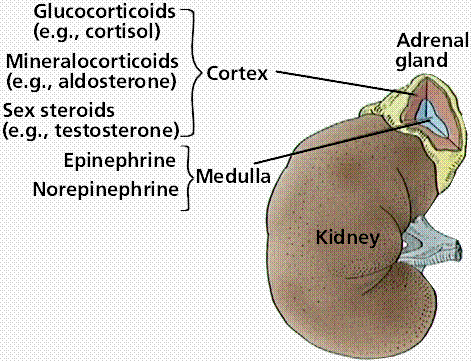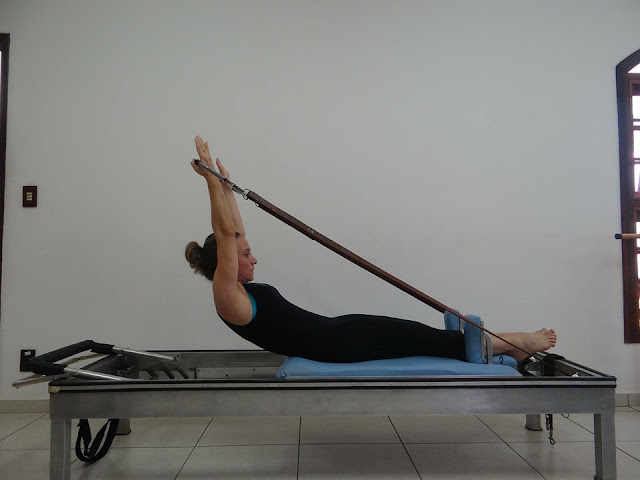ADRENAL HORMONES
ADRENAL GLANDS:
It is also called as supra renal glands it consist of two parts.
Adrenal cortex
adrenal medulla
Adrenal cortex Consist of three layers
Zona Glumelulosa (Minralocorticoids)
Zona Faciculeta (Glucocorticoids)
Zona Reticularis (Sex Steroids)
Mineralocorticoids
It is anti insulin hormone
It is also causes lysis of fat which is called lipolysis after
lysis fat converted in to fatty acids and glycerol's , fatty acids and
glycerol send in the blood and increase its level.
It is also cause the lysis of protein and convert the protein into
amino acids.
Glucocorticoid increase the level of amino acids glucose and
fatty acids
2.Glucocorticoids
It is related with a metabolism of glucose
It is a catabolic hormone
It destroy the glycogen which is called glycogenolysis and send
the glucose in to the blood and increases the level of blood glucose,
(generation of glucose from non carbohydrate source which is called
gluconeogenesis), due to the gluconeogenesis blood glucose also increses.
It is anti insulin hormone
It is also causes lysis of fat which is called lipolysis after
lysis fat converted in to fatty acids and glycerol's , fatty acids and
glycerol send in the blood and increase its level.
It is also cause the lysis of protein and convert the protein into
amino acids.
Glucocorticoid increase the level of amino acids glucose and
fatty acids
It is a anti inflammatory
It is anti allergic
It is immunosuppressive
It is helpful in rbc production
3.SEX
HORMONES
It is also gonadocorticoids
In male
Androgen
In females
Oestrogen
It leads to the development of..
Axillary hairs
Pubic hairs
Moustaches, beard
DISEASES
1.Addison disease
it is the deficiency of aldosterone hormone
2. Gynecomastia Disease
It is excess of oestrogen in males
3. Adrenal virilism Disease
It is the excess of androgen in females
4. Cushing Disease
It is the excess of glucocorticoids
ADRENAL
MEDULLA
It is a ectodermal in origin
It
release Hormone medulla epinephrine , non epinephrine (MEN),
it
is a 3 F gland
The combine form of epinephrine and non epinephrine catecholamine
It increase the sympathetic activities of the body,
parasympathetic work opposite to the sympathetic.
ADDISON'S
DISEASE
Overview
Addison's disease is a disorder that occurs when your body
produces insufficient amounts of certain hormones produced by your adrenal
glands. In Addison's disease, your adrenal glands produce too little cortisol
and often insufficient levels of aldosterone as well.
CAUSES
Also called adrenal insufficiency, Addison's disease occurs in all
age groups and affects both sexes. Addison's disease can be life-threatening
SYMPTOMS
Extreme fatigue
Weight loss and decreased appetite
Darkening of your skin (hyperpigmentation)
Low blood pressure
Low blood sugar (hypoglycemia)
Nausea, diarrhea or vomiting
Abdominal pain
Muscle or joint pains
Irritability
Depression
Body hair loss
DIAGNOSES
Addison's disease results when your adrenal glands are damaged,
producing insufficient amounts of the hormone cortisol and often aldosterone as
well. These glands are located just above your kidneys. As part of your
endocrine system, they produce hormones that give instructions to virtually
every organ and tissue in your body.
Blood test.
Measuring your blood levels of sodium, potassium, cortisol and
ACTH gives your doctor an initial indication of whether adrenal insufficiency
may be causing your signs and symptoms. A blood test can also measure
antibodies associated with autoimmune Addison's disease.
ACTH stimulation test
. This test involves measuring the level of cortisol in your blood
before and after an injection of synthetic ACTH. ACTH signals your adrenal
glands to produce cortisol. If your adrenal glands are damaged, the ACTH
stimulation test shows that your output of cortisol in response to synthetic
ACTH is limited or nonexistent
Insulin-induced hypoglycemia test & imaging test may also be
required
TREATMENT
treatment for Addison's disease involves hormone replacement
therapy to correct the levels of steroid hormones your body isn't producing.
Some options for treatment include:
Oral corticosteroids: Hydrocortisone (Cortef), prednisone or cortisone
acetate may be used to replace cortisol. Your doctor may prescribe
fludrocortisone to replace aldosteids
Corticosteroid injections:
If you're ill with vomiting and can't retain oral medications,
injections may be needed.




Thank you for sharing these tips with us. I'm one of the million people suffer from back pain and I want to avoid it so I decided to find many different blogs to help me to cure it. Finally, I found the right blog and I learned many important things here. Keep sharing! Pain Relief Clinic
ReplyDelete